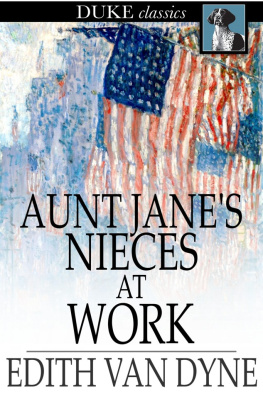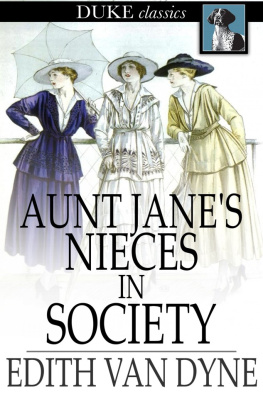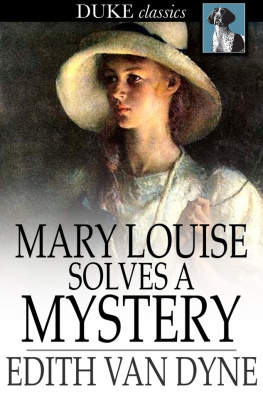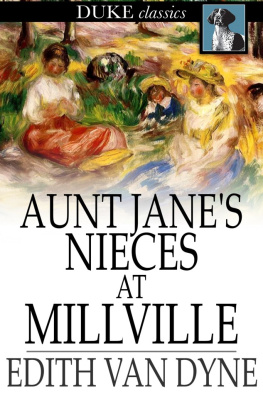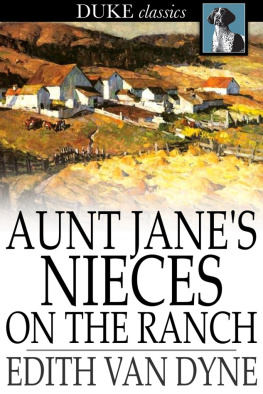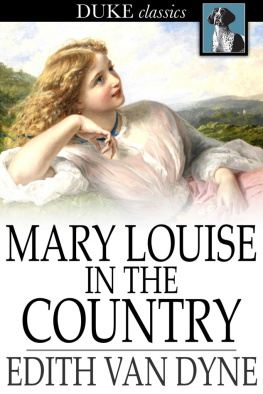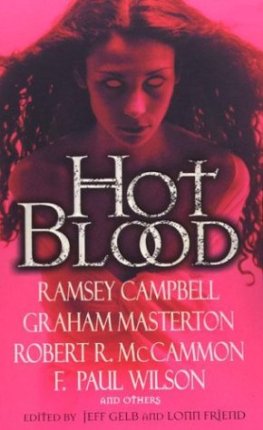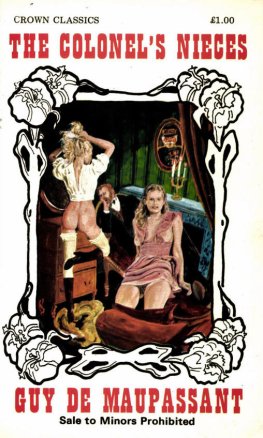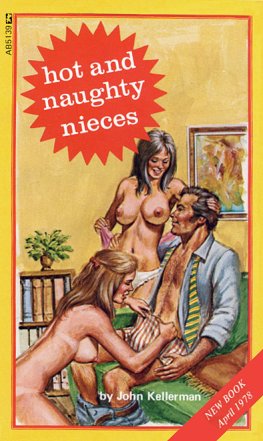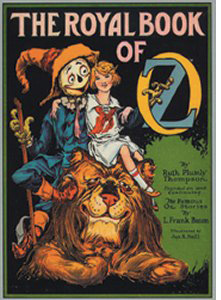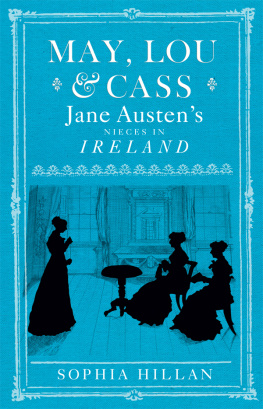AUNT JANE'S NIECES AT WORK
* * *
EDITH VAN DYNE
*
Aunt Jane's Nieces at Work
First published in 1909
ISBN 978-1-62013-581-5
Duke Classics
2014 Duke Classics and its licensors. All rights reserved.
While every effort has been used to ensure the accuracy and reliability of the information contained in this edition, Duke Classics does not assume liability or responsibility for any errors or omissions in this book. Duke Classics does not accept responsibility for loss suffered as a result of reliance upon the accuracy or currency of information contained in this book.
Contents
*
Chapter I - Miss Doyle Interferes
*
"Daddy," said Patricia Doyle at the breakfast table in her cosy New Yorkapartment, "here is something that will make you sit up and takenotice."
"My dear Patsy," was the reply, "it's already sitting up I am, an'taking waffles. If anything at all would make me take notice it's yourown pretty phiz."
"Major," remarked Uncle John, helping himself to waffles from a freshplate Nora brought in, "you Irish are such confirmed flatterers that youflatter your own daughters. Patsy isn't at all pretty this morning.She's too red and freckled."
Patsy laughed and her blue eyes danced.
"That comes from living on your old farm at Millville," she retorted."We've only been back three days, and the sunburn sticks to me like aburr to a kitten."
"Pay no attention to the ould rascal, Patsy," advised the Major,composedly. "An' stop wavin' that letter like a white flag of surrender.Who's it from?"
"Kenneth."
"Aha! An' how is our lad?"
"Why, he's got himself into a peck of trouble. That's what I want totalk to you and Uncle John about," she replied, her happy face growingas serious as it could ever become.
"Can't he wiggle out?" asked Uncle John.
"Out of what?"
"His trouble."
"It seems not. Listen"
"Oh, tell us about it, lassie," said the Major. "If I judge rightthere's some sixty pages in that epistle. Don't bother to read itagain."
"But every word is important," declared Patsy, turning the letter over,"except the last page," with a swift flush.
Uncle John laughed. His shrewd old eyes saw everything.
"Then read us the last page, my dear."
"I'll tell you about it," said Patsy, quickly. "It's this way, you see.Kenneth has gone into politics!"
"More power to his elbow!" exclaimed the Major.
"I can't imagine it in Kenneth," said Uncle John, soberly. "What's he infor?"
"Forforlet's see. Oh, here it is. For member of the House ofRepresentatives from the Eighth District."
"He's flying high, for a fledgling," observed the Major. "But Kenneth'sa bright lad and a big gun in his county. He'll win, hands down."
Patsy shook her head.
"He's afraid not," she said, "and it's worrying him to death. He doesn'tlike to be beaten, and that's what's troubling him."
Uncle John pushed back his chair.
"Poor boy!" he said. "What ever induced him to attempt such a thing?"
"He wanted to defeat a bad man who now represents Kenneth's district,"explained Patsy, whose wise little head was full of her friend'sdifficulties; "and"
"And the bad man objects to the idea and won't be defeated," added theMajor. "It's a way these bad men have."
Uncle John was looking very serious indeed, and Patsy regarded himgratefully. Her father never would be serious where Kenneth wasconcerned. Perhaps in his heart the grizzled old Major was a bit jealousof the boy.
"I think," said the girl, "that Mr. Watson got Ken into politics, for hesurely wouldn't have undertaken such a thing himself. And, now he's in,he finds he's doomed to defeat; and it's breaking his heart, UncleJohn."
The little man nodded silently. His chubby face was for once destituteof a smile. That meant a good deal with Uncle John, and Patsy knew shehad interested him in Kenneth's troubles.
"Once," said the Major, from behind the morning paper, "I was inpolitics, meself. I ran for coroner an' got two whole votesme own an'the undertaker's. It's because the public's so indiscriminating thatI've not run for anything sinceexcept th' street-car."
"But it's a big game," said Uncle John, standing at the window with hishands deep in his pockets; "and an important game. Every good Americanshould take an interest in politics; and Kenneth, especially, who hassuch large landed interests, ought to direct the political affairs ofhis district."
"I'm much interested in politics, too, Uncle," declared the girl. "If Iwere a man I'dI'dbe President!"
"An' I'd vote fer ye twenty times a day, mavourneen!" cried the Major."But luckily ye'll be no presidentunless it's of a woman's club."
"There's the bell!" cried Patsy. "It must be the girls. No one elsewould call so early."
"It's Beth's voice, talking to Nora," added her father, listening; andthen the door flew open and in came two girls whose bright and eagerfaces might well warrant the warm welcome they received.
"Oh, Louise," cried Patsy, "however did you get up so early?"
"I've got a letter from Kenneth," was the answer, "and I'm so excited Icouldn't wait a minute!"
"Imagine Louise being excited," said Beth, calmly, as she kissed UncleJohn and sat down by Patsy's side. "She read her letter in bed andbounced out of bed like a cannon-ball. We dressed like the 'lightningchange' artist at the vaudeville, and I'm sure our hats are not onstraight."
"This bids fair to be a strenuous day," observed the Major. "Patsy's hada letter from the boy, herself."
"Oh, did you?" inquired Louise; "and do you know all about it, dear?"
"She knows sixty pages about it," replied Major Doyle.
"Well, then, what's to be done?"
The question was addressed to Patsy, who was not prepared to reply. Thethree cousins first exchanged inquiring glances and then turned theireager eyes upon the broad chubby back of Uncle John, who maintained hisposition at the window as if determined to shut out the morningsunlight.
Louise Merrick lived with her mother a few blocks away from Patsy'sapartment, and her cousin Beth DeGraf was staying with her for a time.They had all spent the summer with Uncle John at Millville, and had onlyreturned to New York a few days before. Beth's home was in Ohio, butthere was so little sympathy between the girl and her parents that shewas happy only when away from them. Her mother was Uncle John's sister,but as selfish and cold as Uncle John was generous and genial. Beth'sfather was a "genius" and a professor of musicone of those geniuseswho live only in their own atmosphere and forget there is a world aroundthem. So Beth had a loveless and disappointed childhood, and only afterUncle John arrived from the far west and took his three nieces "underhis wing," as he said, did her life assume any brightness or interest.
Her new surroundings, however, had developed Beth's characterwonderfully, and although she still had her periods of sullen depressionshe was generally as gay and lovable as her two cousins, but in aquieter and more self-possessed way.
Louise was the eldesta fair, dainty creature with that indescribable"air" which invariably wins the admiring regard of all beholders.Whatever gown the girl wore looked appropriate and becoming, and hermanner was as delightful as her appearance. She was somewhat frivolousand designing in character, but warm-hearted and staunch in herfriendships. Indeed, Louise was one of those girls who are so complex asto be a puzzle to everyone, including themselves.
Beth DeGraf was the beauty of the group of three, and she also possessedgreat depth of character. Beth did not like herself very well, and wasalways afraid others would fail to like her, so she did not win friendsas easily as did Louise. But those who knew the beautiful girlintimately could read much to admire in the depth of her great darkeyes, and she was not the least interesting of the three nieces whosefortunes had been so greatly influenced by Aunt Jane and Uncle JohnMerrick.

